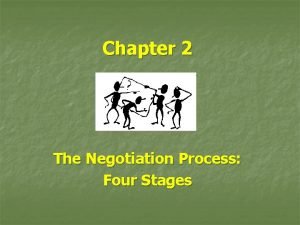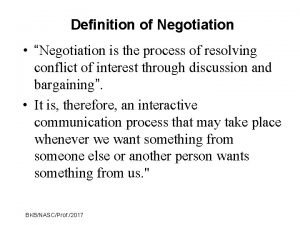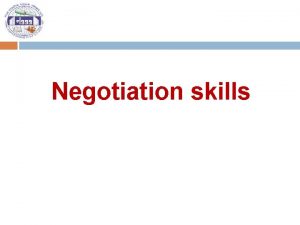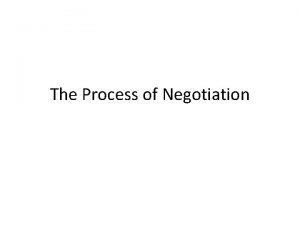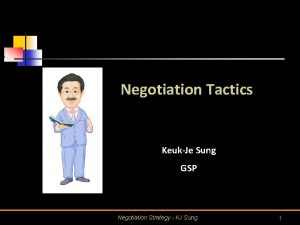Definition of Negotiation Negotiation is the process of




















- Slides: 20

Definition of Negotiation • “Negotiation is the process of resolving conflict of interest through discussion and bargaining”. • It is, therefore, an interactive communication process that may take place whenever we want something from someone else or another person wants something from us. " BKB/NASC/Prof. /2017

• It is such a common activity that most people do it at some point every day, to sort out differences with other people, or to get what they want. Negotiation, therefore, really covers every area of life. BKB/NASC/Prof. /2017

Using the Elements Communication Relationship Interests Options If “No” Alternatives Copyright © 2008 CMPartners. All rights reserved BKB/NASC/Prof. /2017 Legitimacy If “Yes” Commitment

Circle of Value Explore Interest, Develop Options for Joint Gain, Use Objective Standard to Establish Legitimacy

Explore INTERESTS Not Positions/Demands • The core concerns, aspirations, wants, needs, hopes, fears, motives, goals, etc. of each party • Our interests drive our behavior • They are the foundation of the demands and positions that surface in a negotiation BKB/NASC/Prof. /2017

The Orange Example A mother of two children has one orange left in her fruit bowl. Both children are implicitly claiming the orange for themselves: “Mom, I absolutely want this orange!” BKB/NASC/Prof. /2017

What should the mother do? • Should she flip a coin? • Should she cut the orange into two equal pieces? • Should she let her children fight over the orange? BKB/NASC/Prof. /2017

? “Why do each of you absolutely want this orange? ” BKB/NASC/Prof. /2017

Daughter: Son: The daughter would like to bake a cake. Therefore she only needs the skin of the orange to add some flavor. The son is thirsty and would like to squeeze the orange for a glass of fresh juice. To do so he does not need the skin of the orange. BKB/NASC/Prof. /2017

Develop OPTIONS for Joint Gain • Options for joint gain • Possible outcomes of the negotiation • What either party might agree to • Creative options come from deep exploration of the parties’ interests • Inquiry and sharing of information are key tools • It promotes better solutions BKB/NASC/Prof. /2017

Possible OPTIONS for Orange story • To cut the Orange in half. • One to take all the fruit, and for the other to take all the peel. • To take the orange, squeeze a glass of orange juice, sell it, and then go buy two more oranges BKB/NASC/Prof. /2017

Use Objective Standards to Establish LEGITIMACY • Objective criteria, benchmarks, principles, laws, regulations, standards, practices, traditions, researched evidence, etc. • Convey a sense of fairness • Each party can have separate sources of legitimacy BKB/NASC/Prof. /2017

WHEN WE ARE IN THE CIRCLE, OUR INQUIRY SKILLS BECOME VERY IMPORTANT THEN THAT OF OUR ADVOCACY. BKB/NASC/Prof. /2017

Strategic Inquiry Guidelines Inquiry into INTERESTS • What are you trying to accomplish in these negotiations? • What are your key motivations in these negotiations? • What are you concerned about? • Do you feel we “must” do a deal here? • Would you prefer to work something out jointly ? • What interests would be better met if we don’t agree? BKB/NASC/Prof. /2017

Strategic Inquiry Guidelines Inquiry into OPTIONS • What would be wrong with. . . ? • What other ideas might we brainstorm on this problem? • If we work together, how might we make this better for both of us? • Do you have the authority to make a decision on this? • Do others need to be here to get this done? • What would be your reaction to a possible offer like. . . ? • If I were able to offer you “x, ” could you say “yes” today? BKB/NASC/Prof. /2017

Strategic Inquiry Guidelines Inquiry into LEGITIMACY • Why do you think we ought to do that? • What benchmarks do you see in our field of work that make this appropriate? • If you were I, how would you justify that to others? BKB/NASC/Prof. /2017

BATNA - BATNA is the acronym for Best Alternative To a Negotiated Agreement. - Your BATNA is the choice you can make if you conclude that negotiating with a particular party is not likely to yield a favorable result. - You can walk away from a negotiation if your BATNA is better than the likely outcome of that negotiation. BKB/NASC/Prof. /2017

• BATNAs are not always readily apparent. • Fisher and Ury outline a simple process for determining your BATNA: – develop a list of actions you might conceivably take if no agreement is reached; – improve some of the more promising ideas and convert them into practical options; and – select, tentatively, the one option that seems best. BKB/NASC/Prof. /2017

While you are in circle, please be aware about your Emotion. BKB/NASC/Prof. /2017

Thank You for Your Active Participation BKB/SP/NASC/9851156111/binodb 1@live. com BKB/NASC/Prof. /2017
 Nnn stages
Nnn stages Triangle talk in a sourcing negotiation process
Triangle talk in a sourcing negotiation process 4 stages of negotiation process
4 stages of negotiation process Definition of negotiation
Definition of negotiation Hình ảnh bộ gõ cơ thể búng tay
Hình ảnh bộ gõ cơ thể búng tay Slidetodoc
Slidetodoc Bổ thể
Bổ thể Tỉ lệ cơ thể trẻ em
Tỉ lệ cơ thể trẻ em Chó sói
Chó sói Chụp tư thế worms-breton
Chụp tư thế worms-breton Hát lên người ơi
Hát lên người ơi Môn thể thao bắt đầu bằng chữ đua
Môn thể thao bắt đầu bằng chữ đua Thế nào là hệ số cao nhất
Thế nào là hệ số cao nhất Các châu lục và đại dương trên thế giới
Các châu lục và đại dương trên thế giới Công thức tính độ biến thiên đông lượng
Công thức tính độ biến thiên đông lượng Trời xanh đây là của chúng ta thể thơ
Trời xanh đây là của chúng ta thể thơ Cách giải mật thư tọa độ
Cách giải mật thư tọa độ Phép trừ bù
Phép trừ bù độ dài liên kết
độ dài liên kết Các châu lục và đại dương trên thế giới
Các châu lục và đại dương trên thế giới Thơ thất ngôn tứ tuyệt đường luật
Thơ thất ngôn tứ tuyệt đường luật
